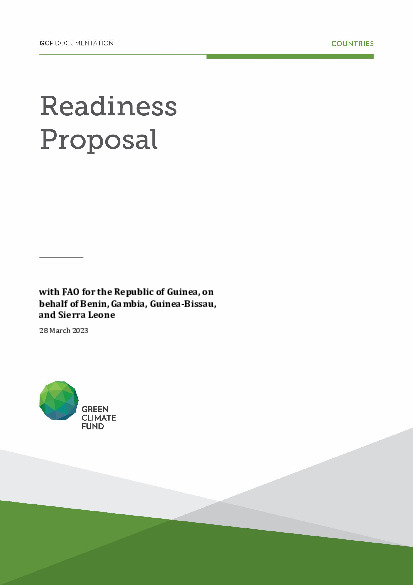Institutional and technical support for REDD+ readiness in West Africa

Institutional and technical support for REDD+ readiness in West Africa
All participating countries for this proposal are Least Developed Countries where economy’s is mainly based on the subsistence agriculture, and natural resources exploitation, including forest resources. Because of this anthropogenic pressure for economic development, natural forest resources are receding at an alarming rate. Despite the low-level contribution of participating countries to global GHG emissions, climate change is a vital concern considering the vulnerability of their economic base to climate change. All participating countries ratified the United Nations Framework Convention on Climate Change and the Paris Agreement. They have expressed their commitments for 2030 via their Nationally Determined Contributions (NDCs).
Agriculture, forestry and other land use (AFOLU) sector is one of themain emitting sectors in participating countries and a priority sector in their NDCs. To address climate change issues in forestry and the land use sector, the NDCs point out to reduce deforestation and forest degradation, promote forest conservation, sustainable management of forests and enhancement of forest carbon stocks through forest restoration. The article 5 of the Paris Agreement encourages parties to take action and implement the existing framework as set out under the convention for policy approaches and positive incentives for activities relating to REDD+
COP 19, adopted the 7 decisions of the Warsaw Framework for REDD+, which pillars represent a strategic step to manage forests more sustainably, thereby enhancing their mitigation and adaptation values. Despite of support received by participating countries from donors, progress made in the readiness (development of a REDD+ strategy, NFMS: National Forest Monitoring System, FREL / FRL: Forest Reference Emission Level/Forest Reference Level and SIS: Safeguards Information System) or implementation of REDD+ phases are still at an early stage in participating countries. None of the four pillars are at this time completed (see table 7). To fully implement policy approaches and positive incentives for REDD+ activities, many challenges and gaps are identified for all participating countries including: 1) the development or REDD+ roadmap; 2) coordination among public structures to manage large-scale program as REDD+; 3) access of stakeholders on decision making process; 4)strengthening of climate change policy framework/ national strategy for the implementation of the NDC; 5) effective regulatory framework; 6) limited scientific, technological and innovation capacity to develop NFMS /MRV (measurement, reporting and verification) system; and 7) knowledge exchange capacities of NDAs, technical and financial partners to raise awareness and engage with multiple stakeholders (See table 8 for details about country’s specific gaps/challenges/barriers).